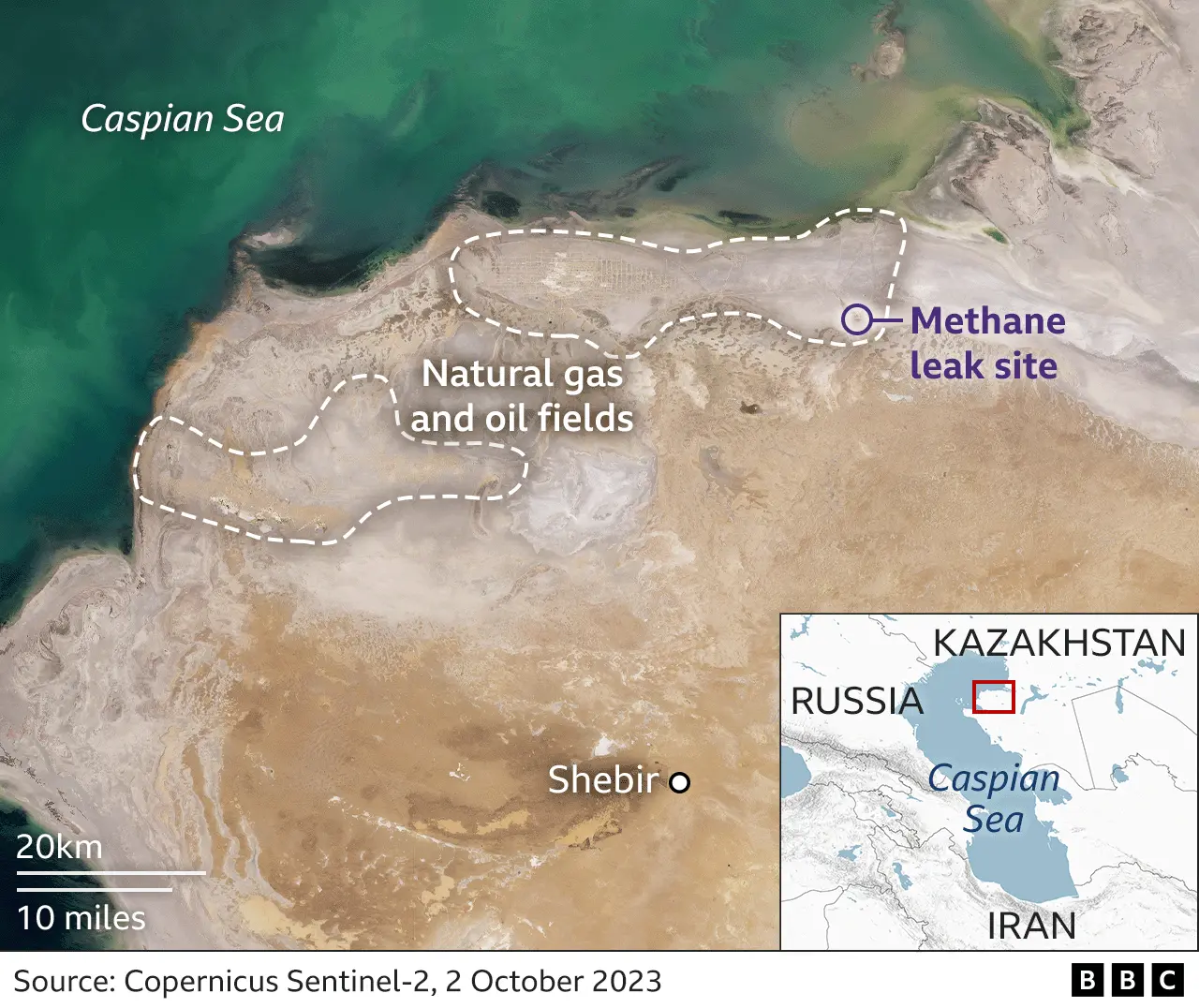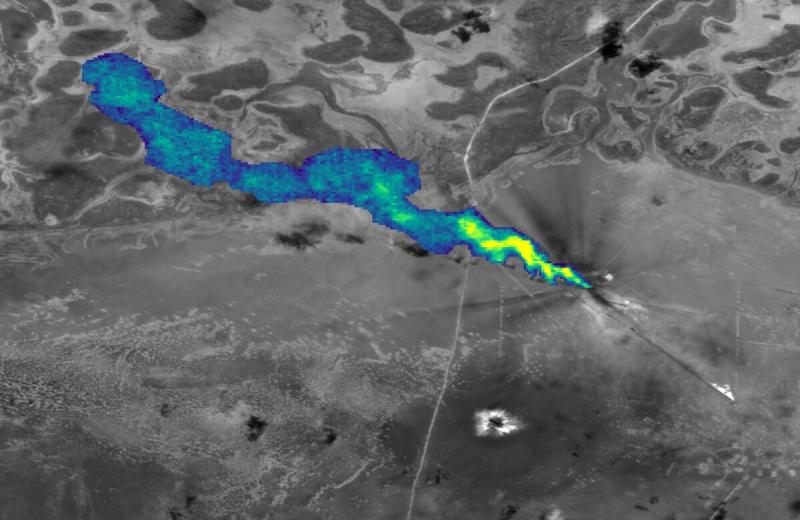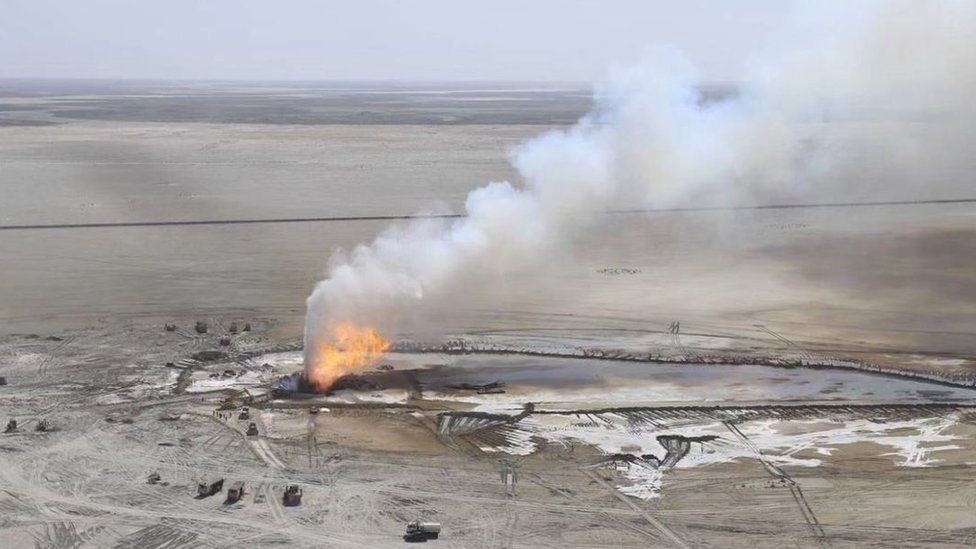Last year, a remote oil well in Kazakhstan experienced one of the most significant methane emissions ever documented . These conclusions were made by the authors of the study, which had access to the verification department of BBC Verify. According to preliminary estimates, about 127 thousand tons of gas were released from the well. This incident caused a fire that lasted for more than six months.
Methane leak: Buzachi Oil company denies significant volume
Methane surpasses carbon dioxide as a potent greenhouse gas, as acknowledged by Buzachi Oil. which owns the well, and denies that a “significant volume” amount of methane is released. As per the Greenhouse Gas Equivalency Calculator of the US Environmental Protection Agency, the ecological consequences of such a leakage equate to driving over 717,000 gasoline-fueled cars for a year. Manfredi Caltagirone, the director of the UN International Methane Observatory, expressed surprise at the scale and duration of the leak, calling it extremely significant.
Kazakhstan: devastating methane leak and controversy over causes
The leak of an exploded well in the Mangistau region of Kazakhstan, which began on June 9, 2023, continued until the end of the year, causing a fire that was only extinguished by Christmas. Local officials informed the BBC that efforts are presently in progress to seal the well with cement.
Methane, the primary element of natural gas, remains imperceptible to human vision. Yet, when sunlight penetrates a methane cloud, it creates a characteristic trail that can be detected by some satellites. The methane leak was first discovered by the French geoanalytical company Kayrros. The Dutch Space Research Institute and the Polytechnic University of Valencia Confirmed the results of the analysis.

Scientists examined satellite information and detected 115 cases of high methane concentrations between June and December last year. Based on this data, they concluded that a single well leaked 127,000 tons of methane, potentially marking the second-largest methane release ever recorded.
A scientist from the Polytechnic University of Valencia, Luis Guanter, believes that only sabotage on the Nord Stream could have caused such a powerful leak. Underwater explosions that destroyed pipelines in September 2022 led to the release of up to 230 thousand tons of methane.
As per the International Energy Agency, 30% of the increase in worldwide temperatures is due to methane emissions. Scientists assertion that a vast quantity of methane was released from this well, confirming this with the help of data from five distinct satellite devices. The Mangistau Ecology Department Verified that the methane levels in the atmosphere surpassed permissible standards in 10 cases from June to September. According to the statement, a few hours after the leak began, the level of methane in the air exceeded the permissible level by 50 times.
Kazakh company Buzachi Oil denies that there was a large release of methane from the well, arguing that there was only a “minor” amount of gas and any methane would have burned off when it came out of the well. They believe that only water vapor entered the air , producing significant white plumes visible from space. Deputy Director of the company, Daniyar Duisembayev, emphasized a responsible approach to the situation. However, research commissioned by the company and unavailable to the BBC may challenge Kayrros’ findings. Scientists involved in the Kayrros study reject these arguments, pointing out that their measurements were based on specific traces of methane, unaffected by water vapor or smoke.

Kazakhstan joins international efforts to reduce emissions
An official investigation into the accident in Kazakhstan showed that the Buzachi Oil company did not control the well drilling process, and the subcontractor Zaman Energo made many mistakes. The Energy Department said cleaning up the methane leak is challenging. Kazakhstan, like Turkmenistan, has experienced large methane leaks, but the incident in the Mangystau region stands out as the largest. Experts warn of the risk of new leaks with further gas production, andKazakhstan has participated in the Global Methane Pledge, a voluntary commitment involving over 150 nations aiming to decrease methane emissions by 30% before 2030.

